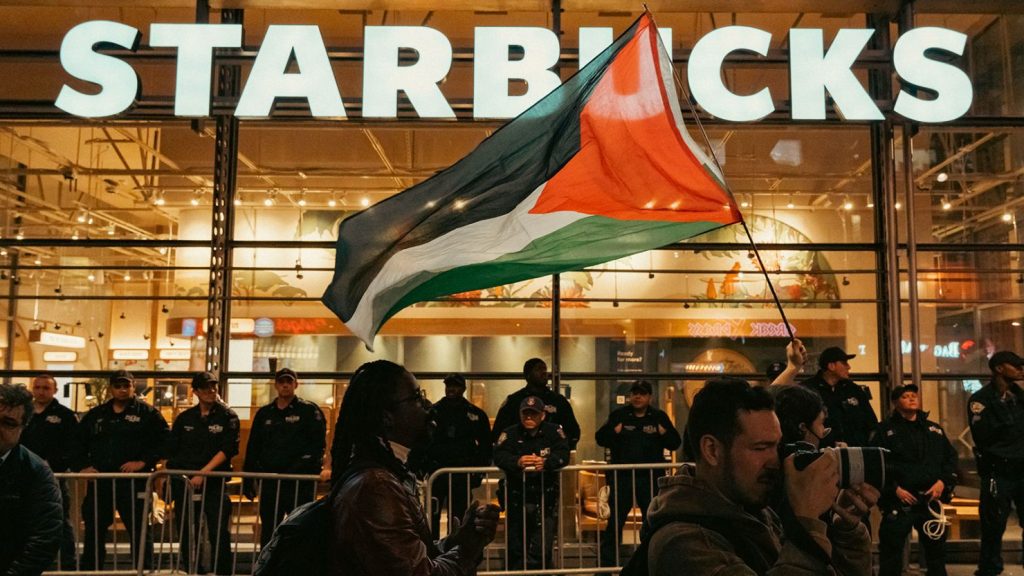Understanding the Starbucks Boycott: Origins, Impact, and Future Outlook
In October 2023, there was a big push to boycott Starbucks because people were talking about the company supporting Israel. This talk spread online and on college campuses. By February, sales had dropped in every Starbucks shop on campuses.
Starbucks doesn’t directly run these campus stores; they get a share of the profits. But the Starbucks boycott still affected them. In the first three months of 2024, the money made from these licensed stores only went up by 6.5%. This is much lower than the 31.6% increase they saw in 2023 and the 38.6% increase in 2022.

Starbucks Boycott: Origins, Controversies, and Corporate Responses
The boycott started when Starbucks Workers United, made up of Starbucks baristas, tweeted support for Palestine in October. Starbucks got upset and sued the union because they wouldn’t delete the tweet. Starbucks said they faced angry customers who thought the company was supporting Palestine.
This clash between the union and Starbucks, along with cases of employees getting fired, past donations to Israeli companies, and accusations of supporting the Israeli military, led to the boycott. Even though Starbucks stopped showing their donations, they said in December that they never used their money for military purposes.
Sara Kelly, a top Starbucks official, said in October that the company condemns terrorism, hate, and violence. She also noted that Starbucks Workers United’s views don’t represent Starbucks’ views.
Why People Are Boycotting Starbucks
You might have seen a lot of people talking about boycotting Starbucks lately, which might be confusing. This boycott is linked to a conflict in the Middle East.
Starbucks and the union representing its workers got into a legal battle because the union posted support for Palestinians during the Israel-Hamas conflict. Starbucks sued the union, claiming trademark infringement. The union countered by saying Starbucks implied they support violence.
Starbucks made it clear they don’t support the union’s views and condemned the violence. However, this led to public outrage, with many people using #boycottstarbucks on platforms like TikTok and Facebook etc.
While Starbucks says it’s lost customers over this issue, many of those boycotting are supporters of Palestinians. They express their dissatisfaction with Starbucks using social media hashtags like #boycottstarbucks and #freePalestine.
Insights into the Starbucks Boycott: Perspectives, Challenges, and Individual Stances
Allyson Brantley, who wrote “Brewing a Boycott,” pointed out that the Starbucks boycott is unique because it lacks a clear story. She mentioned that conflicting information about how Starbucks uses its money and the need for a specific goal might weaken the boycott’s impact.
Brantley couldn’t predict how long the boycott would continue but suggested it might last as long as the conflict in Israel and Palestine remains in people’s minds and the news.
She emphasized that a boycott’s success isn’t just about what the company does; it’s successful if it brings people together and makes them think about the consequences of their choices as consumers.
Laila Qutob, a physics sophomore, shared that she never supported Starbucks because her Palestinian family told her about the company’s support for Israel. Now, she enjoys exploring different coffee shops in the city. Qutob continues her boycott, hoping Starbucks will take action in support of Palestine or at least make a public statement to raise awareness.
She believes it’s her right to take a stand against issues, especially when it is possible to do so in her country.
Does Starbucks Support Israel
Starbucks has faced rumors on social media suggesting it supports Israel financially or funds its military. However, the company has not taken a public stance on the conflict.
In December, Starbucks clarified that it has “no political agenda” and does not use its profits to fund government or military activities anywhere. This statement came after CEO Laxman Narasimhan condemned violence, hate speech, and misinformation. Protestors have even targeted Starbucks stores due to online perceptions about its alleged support for Israel.
Starbucks Kuwait’s website also explicitly denied these rumors, calling them “absolutely untrue.” They emphasized that any financial support to Israel’s military would have been disclosed as required by law.
Despite these clarifications, calls for boycotting Starbucks continued, showing companies’ challenges in countering misinformation online.
Starbucks Partner to Cut Jobs Amid Boycott Fallout
Franchise owner AlShaya Group is set to lay off around 4% of its 50,000-strong workforce in the Middle East and North Africa (MENA) region. According to Reuters, the decision comes as a response to challenging trading conditions over the past six months. Most of the job cuts will affect Starbucks franchise operations.
In a statement, AlShaya mentioned, “Due to ongoing difficult trading conditions, we regretfully have to reduce the number of colleagues in our Starbucks MENA stores. We will support those leaving the business and their families during this time.”
The boycotts associated with the conflict have impacted AlShaya’s business and Starbucks due to lower royalty payments to starbucks partners.
Is Starbucks Boycott Working?
The Starbucks boycott Israel has gained traction among various groups and individuals, but its effectiveness remains debatable.
Following a social media post by the workers’ union supporting Palestinians, Starbucks reported that some customers became confrontational towards employees and sent threatening messages to customer service staff.
Starbucks workers, former baristas, and Palestinian advocacy groups nationwide have initiated a boycott, urging people not to buy Starbucks products and promoting local coffee shops as alternatives.
Groups like Students Against Apartheid at Arizona State University have led in organizing boycott efforts in Tempe and Phoenix. They educate students about what they perceive as Starbucks’s problematic labor practices and express solidarity with Palestinian territories amid ongoing conflicts in the region.
Despite these efforts, the Starbucks boycott impacts on Starbucks’s operations and sales remains uncertain. While some individuals and groups have actively participated in the boycott, Starbucks continues to operate and maintain its market presence. The extent of the boycott’s success or failure is yet to be entirely determined.
Analyzing the Impact of the Starbucks Boycott on Financial Performance and Market Sentiment
The boycott’s effects on Starbucks’ financial results in different parts of the world, like China, Japan, Latin America, and Europe, were unclear in the Middle East and Africa markets. This uncertainty arose because most of the revenue increase in the international market mainly came from China recovering from the disruptions caused by the COVID-19 pandemic. Conversely, other markets didn’t see similar growth and might have even shown decreased growth.
In an exciting twist in Starbucks’ financial report, the company indirectly talked about the boycott’s impact. They mentioned that the challenges faced in the first quarter of fiscal 2024, though temporary, might continue to affect their business for the rest of the fiscal year. However, despite these temporary challenges, they also expressed confidence in their long-term growth and business model.
The boycott’s impact was noticeable, as Starbucks’ share prices declined by about 9% since mid-November, reducing market value by around $11 billion. It’s important to note that other factors might have contributed to this decline as well. The differences in the first quarter’s financial results also shed light on the boycott’s impact.
The big question remains: Will the boycott persist, or is it just a temporary setback, as the company suggests, and will things soon return to normal?
Conclusion
The Starbucks boycott, triggered by allegations of support for Israel, has seen significant repercussions. Sales at campus stores dropped following the boycott’s surge in October. The boycott, initiated by Starbucks Workers United, led to clashes and legal actions between the union and Starbucks. Despite Starbucks denying direct military funding, the boycott’s impact extended to international markets, impacting revenues and leading to job cuts at franchise owner AlShaya Group. This upheaval has prompted questions about the boycott’s longevity and its lasting effects on Starbucks’ financial performance and market sentiment.
FAQs
According to their financial report, what challenges did Starbucks face from the boycott?
Starbucks acknowledged challenges in its financial report, mentioning transitory headwinds that might continue affecting its business but expressing confidence in its long-term growth.
How did Starbucks respond to the allegations and the boycott?
Starbucks denied direct military funding and condemned hate, violence, and terrorism, emphasizing that the views expressed by Starbucks Workers United didn’t represent the company’s views.
What impact did the boycott have on Starbucks’ financial performance internationally?
The boycott’s impact on Starbucks’ financial performance in international markets, particularly in the Middle East and Africa, was unclear, with differing growth rates across regions.
